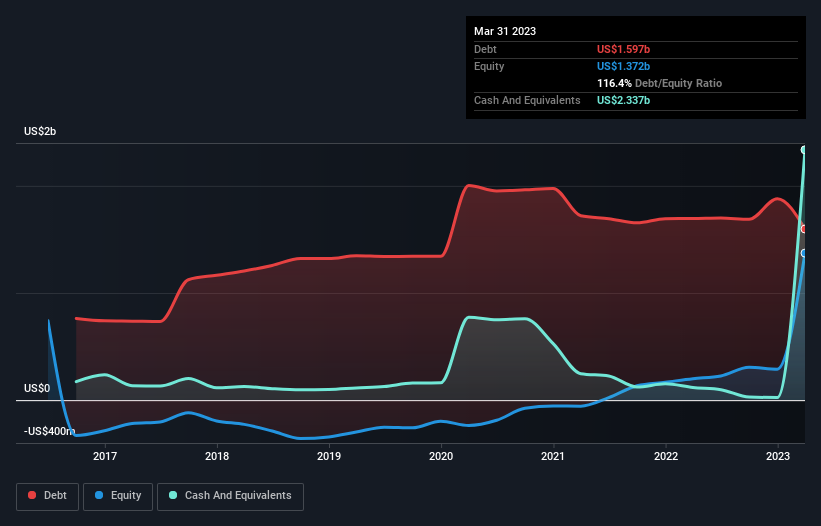- United States
- /
- Specialty Stores
- /
- NYSE:VVV
Here's Why Valvoline (NYSE:VVV) Can Manage Its Debt Responsibly

Howard Marks put it nicely when he said that, rather than worrying about share price volatility, 'The possibility of permanent loss is the risk I worry about... and every practical investor I know worries about.' So it might be obvious that you need to consider debt, when you think about how risky any given stock is, because too much debt can sink a company. As with many other companies Valvoline Inc. (NYSE:VVV) makes use of debt. But should shareholders be worried about its use of debt?
Why Does Debt Bring Risk?
Debt assists a business until the business has trouble paying it off, either with new capital or with free cash flow. Ultimately, if the company can't fulfill its legal obligations to repay debt, shareholders could walk away with nothing. While that is not too common, we often do see indebted companies permanently diluting shareholders because lenders force them to raise capital at a distressed price. Of course, debt can be an important tool in businesses, particularly capital heavy businesses. The first thing to do when considering how much debt a business uses is to look at its cash and debt together.
Check out our latest analysis for Valvoline
How Much Debt Does Valvoline Carry?
As you can see below, Valvoline had US$1.60b of debt at March 2023, down from US$1.70b a year prior. But on the other hand it also has US$2.34b in cash, leading to a US$739.4m net cash position.

How Strong Is Valvoline's Balance Sheet?
Zooming in on the latest balance sheet data, we can see that Valvoline had liabilities of US$621.6m due within 12 months and liabilities of US$2.29b due beyond that. Offsetting this, it had US$2.34b in cash and US$61.1m in receivables that were due within 12 months. So it has liabilities totalling US$510.3m more than its cash and near-term receivables, combined.
Of course, Valvoline has a market capitalization of US$6.42b, so these liabilities are probably manageable. But there are sufficient liabilities that we would certainly recommend shareholders continue to monitor the balance sheet, going forward. Despite its noteworthy liabilities, Valvoline boasts net cash, so it's fair to say it does not have a heavy debt load!
Unfortunately, Valvoline's EBIT flopped 17% over the last four quarters. If earnings continue to decline at that rate then handling the debt will be more difficult than taking three children under 5 to a fancy pants restaurant. The balance sheet is clearly the area to focus on when you are analysing debt. But ultimately the future profitability of the business will decide if Valvoline can strengthen its balance sheet over time. So if you're focused on the future you can check out this free report showing analyst profit forecasts.
But our final consideration is also important, because a company cannot pay debt with paper profits; it needs cold hard cash. While Valvoline has net cash on its balance sheet, it's still worth taking a look at its ability to convert earnings before interest and tax (EBIT) to free cash flow, to help us understand how quickly it is building (or eroding) that cash balance. Over the most recent three years, Valvoline recorded free cash flow worth 63% of its EBIT, which is around normal, given free cash flow excludes interest and tax. This cold hard cash means it can reduce its debt when it wants to.
Summing Up
We could understand if investors are concerned about Valvoline's liabilities, but we can be reassured by the fact it has has net cash of US$739.4m. So we don't have any problem with Valvoline's use of debt. When analysing debt levels, the balance sheet is the obvious place to start. However, not all investment risk resides within the balance sheet - far from it. For instance, we've identified 1 warning sign for Valvoline that you should be aware of.
When all is said and done, sometimes its easier to focus on companies that don't even need debt. Readers can access a list of growth stocks with zero net debt 100% free, right now.
New: Manage All Your Stock Portfolios in One Place
We've created the ultimate portfolio companion for stock investors, and it's free.
• Connect an unlimited number of Portfolios and see your total in one currency
• Be alerted to new Warning Signs or Risks via email or mobile
• Track the Fair Value of your stocks
Have feedback on this article? Concerned about the content? Get in touch with us directly. Alternatively, email editorial-team (at) simplywallst.com.
This article by Simply Wall St is general in nature. We provide commentary based on historical data and analyst forecasts only using an unbiased methodology and our articles are not intended to be financial advice. It does not constitute a recommendation to buy or sell any stock, and does not take account of your objectives, or your financial situation. We aim to bring you long-term focused analysis driven by fundamental data. Note that our analysis may not factor in the latest price-sensitive company announcements or qualitative material. Simply Wall St has no position in any stocks mentioned.
About NYSE:VVV
Valvoline
Engages in the operation and franchising of vehicle service centers and retail stores in the United States and Canada.
Acceptable track record with mediocre balance sheet.


